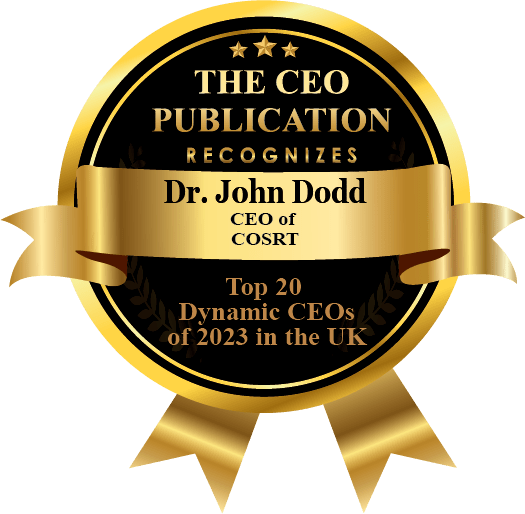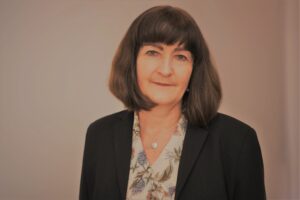

CEO
Dr. John Dodd brings a clear, almost laser-like focus on improving people’s life outcomes—people and service users come first, and the organization must meet their needs—in a way that reflects his experience of working in children’s and cancer charities. He will adapt programs and expend resources if data shows it will lead to improvements for people needing therapeutic help or therapists providing that help. Consequently, COSRT is an agile and dynamic organization in a way never seen before.
Accountability and responsibility are vital to John. He recognizes the need to have a clear vision, but just as importantly, they need to translate that into something meaningful and actionable. For that reason, he delivered the organization’s first multi-year strategy accompanied by tangible objectives, outcomes, and indicators.
This provides a framework for operations based on clarity and consistency – foundations for success. Empowering staff is critical to John and COSRT. Team members are encouraged to voice ideas and engage in planning in a way not seen before. With the direction and goals set, John focuses on removing barriers facing his staff, supporting them to deliver. This reflects a balance of leadership and management necessary to move along a path of growth and development while taking people along with you.
John is also committed to continual improvement and the use of data. It is never good enough to sit back and think, ‘we have arrived.’ That is how stagnation and irrelevance start. Instead, John demands that the organization continues to understand the needs of its members and the public. He constantly engages across sectors to identify innovations and ideas that could be learned, hence taking the company to new heights.
COSRT is the professional body for Psychosexual and Relationship Therapists. It performs a set of highly important functions – protecting the public, improving professional standards, and disseminating knowledge. They set ethical standards, provide information for the public, have an international academic journal, hold a public register of qualified professionals, and conduct complaints. High-quality, accessible training is an important area of work that supports all these functions as therapists need to constantly build their knowledge and skills, keeping up with an ever-changing world. “By providing relevant, interesting, and thought-provoking training we allow those therapists to learn. They become more knowledgeable, reflective, and critical – and therefore more effective in providing therapy. Consequently, as the individual enhances themselves, standards improve, and the public is protected more and more,” says John. “On the other hand, that training is available to anyone. As our topics have become more diverse, we have witnessed many more non-members accessing courses.”
A critical issue is to understand what users need and want. For John and COSRT, that means having insight into the public’s wishes and fee-paying professional members. So, a key strategy to ensure relevance is regular and meaningful engagement. “We carry out regular surveys of our membership, canvassing opinion on issues from the accessibility of our communications to preferred topics for training,” he says. “Alongside that, we collate, analyze, and respond to queries and comments from the public. What are the challenges they look to COSRT for answers for? What barriers are they facing that we can help address? And when we do embark on a new initiative, we look to have meaningful consultation. Policies, procedures, and products are shared with multiple parties. The aim is not simply to get an agreement or fulfill a tick box exercise. It is to get feedback that can help us tailor things to the end-user.”
COSRT carries out a range of work for different audiences linked to improving outcomes and public protection. Since John took the CEO post, improvements and innovations have included the policies and processes that determine professional standards and complaints against therapists. Before his arrival, there were concerns that ethical standards were not as clear as they could be. And that bureaucracy could hinder outcomes when complaints were conducted. The solution implemented by John was root and branch reform. Building on engagement with other organizations and learning from good practices across sectors, a radical work program was implemented. A new code of ethics set standards for clarity and relevance, meaning all members were aware of their expectations of them. The process was adapted to include opportunities for members to resolve complaints voluntarily, mediation was promoted, and new panels instituted to analyze evidence. The benefits were clear for members and the public – a better defined, more engaging process focused on the needs of people and their experiences as much as regulatory outcomes.
Another major solution brought about by John was a redeveloped membership structure. Previously, many interested parties were excluded from membership, while key categories contained highly diverse professions. This led to a major problem – COSRT could not hold a public, voluntary register of trained Psychosexual and Relationship therapists. A six-month project was undertaken to overhaul the structure. Membership was split into Registered and non-Registered categories. The latter allowed categories for affiliates, associates, and retired professionals opening the organization up. Theformer meant that for the first time, therapists who met exacting standards were within two categories. This allowed the creation of the UK’s first voluntary public register of Psychosexual and Relationship Therapists – radically enhancing public protection and the visibility of high-quality professionals.
opening the organization up. The former meant that for the first time, therapists who met exacting standards were within two categories. This allowed the creation of the UK’s first voluntary public register of Psychosexual and Relationship Therapists – radically enhancing public protection and the visibility of high-quality professionals.
In recent years the biggest achievement was a total reorientation of training. Traditionally, COSRT and similar organizations provided training that could be quite exclusive and inaccessible. When COSRT placed people and their outcomes at the center of its work, it meant a new understanding of training.
The result was the development of a new online training platform and new models of training. Self-Access Classes, Online Seminars, Twilight Sessions, and Weekend courses all represented a commitment to putting the user’s needs first. Partnering with academics, public figures, and specialists worldwide meant training was delivered by engaging, relevant, and respected people.
Eighteen months ago, COSRT delivered ten one-day events per year. All in person. Now COSRT has a library of 20 Self-Access Classes scheduled to grow 50% year on year and delivers 15 to 20 online seminars per year. It hosts two annual conferences per year. “Topics are more diverse than ever, from the science of fatherhood to clinical aspects of female sexual health. Diversity and accessibility mean public members now access what was once seen as training only for professionals. And our reach has increased seven-fold in six months,” says John.

" We carry out regular surveys of our membership, canvassing opinion on issues from the accessibility of our communications to preferred topics for training. "




© THE CEO PUBLICATION 2021 | All rights reserved. Terms and condition | Privacy and Policy